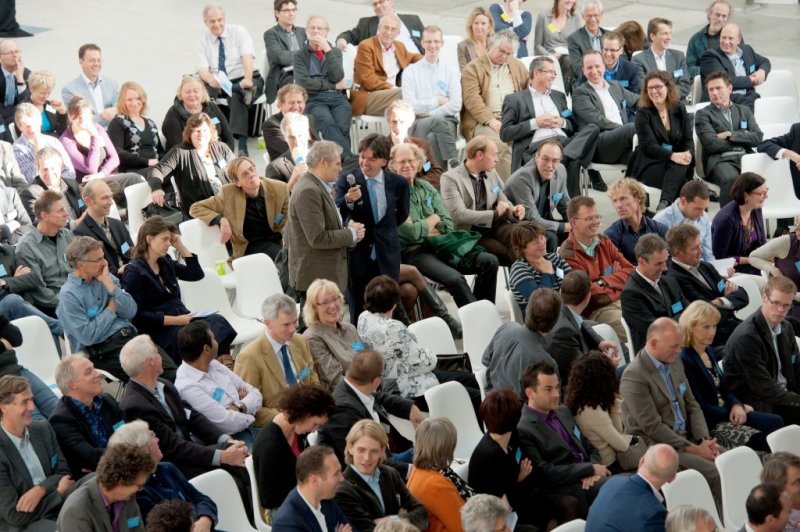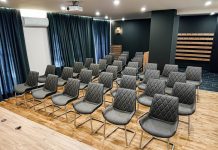In order to make a successful event, it is no longer enough that participants show up and to listen the lecture or presentation, or to be present at the meeting, after which everyone will go their own way. It is necessary that participants, as their name says as well – actively PARTICIPATE.
If the attendees take active participation, that will enable them to influence the very course, contents and dynamics of the event. This will lead to maximal adaptation of the event to the needs and requirements of the attendees, which will certainly result in general satisfaction, as of the attendees so of the organizers, owing to the success and because they will create an event which will leave lasting impressions.
Today, an average businessman attends at least 5 events a year, from festive gatherings, through presentations to the educations and trainings.

He probably hardly remember any events where he was only passive attendants, just being there and listening. Or they just cannot see any significance relating such event, at least not for them.
That is why it is important to engage and involve future participants before, during and after the event. If the participants are involved in advance, they will, for example, share information through social networks, which may contribute to positive anticipation and popularization of the event.
One of the ways to engage the participants before the event, is to ask them questions relating organization of the event – Who is the lecturer they would love to hear, which topics they are interested in, which band would they prefer to listen to, what is the form of the event that suits them most, what is it that they expect?
During the event, if it is of an educational character, the task of the lecturer or the person giving presentation is to keep the attention of participants. As we are all very busy during the day, it is no wonder that we will mainly choose to be passive listeners, unless the lecturer stimulates attention and makes sure that we understand that what they talk about is useful or at least interesting for us. The attention of the audience reaches its peak at the beginning and at the end of presentation. During the presentation, concentration naturally drops.
There are various techniques and approaches that lecturers are using in order to keep the attention of the participants.
1. Asking questions.
People remember maximum 30% of what they hear, but they memorize 85% of the questions they are asked. This includes rhetorical questions as well.

2. Motivation to take notes.
If the participants take notes, that will also have positive effects on their attention, particularly if, on that occasion, they use the images and key words.
3. Activity.
Organize games, or some other activity or few minutes standing exercise. That will stimulate heartbeats, so the heart will feed the brain with more blood, which is a natural way to increase concentration and involvement.
4. Use of analogies and metaphors.
This is the way of helping listeners to understand and memorize what you talk about. The more complex the topic, the better it is to simplify it with a metaphor.
5. Ending on time.
Be brief and clear, and end the lecture/presentation on time, or even slightly earlier. This is the way to pleasantly surprise the audience and give them some space to keep their attention on the most significant items.
Apart from attention-keeping techniques, there are other ways to involve participants into event, during its course.
Polling on the spot.
Carry out poll on the spot, during the conference or some other event. Modern technologies enable simple polling of all attendees by tablets or even mobile phones. In this way, the participants really participate in the event, they learn about opinions and attitudes of others, they can see to what extent their opinions are similar or not. This can provoke further discussions and make the event complete.
Division of participants into teams.
Participants can divided into groups with the purpose of discussion, resolving some cases from practice, project teams, with the task to think up the name for their group. This is the way to indirectly “make” them participate, while the relations
among them will be deepened.
Graffiti boards.
Place large boards (for writing with markers or chalk) to the noticeable position and motivate participants to be creative and to write some messages, express their opinions, draw something. They can also display photos from previous events, etc.

Pecha Kucha.
Pecha Kucha 20×20 or 10×10 (10 slides for 10 seconds each) is a style and form of presentation, of which the objective is to make quicker and more concise presentation, in order to keep attention. It usually involves several speakers and topics that are alternating.
In order to keep participants and their involvement even after the event, so called “offsite” events are being organized, of which the aim is amusement of participants, like happy hours, parties, sightseeing, etc.
One of the simplest ways to keep the participants involved in conference after the event is to make sure that they feel cosy and comfortable, so that they do not “escape” on breaks between the lectures. Make “lounge” atmosphere in break rooms, where they can have some coffee and water, free Wi-Fi internet, and the possibility of charging their mobile phones and tablets.
To sum up everything, the event will have a positive feedback to the extent to which the attendees actively participate.





































 Srpski
Srpski English
English